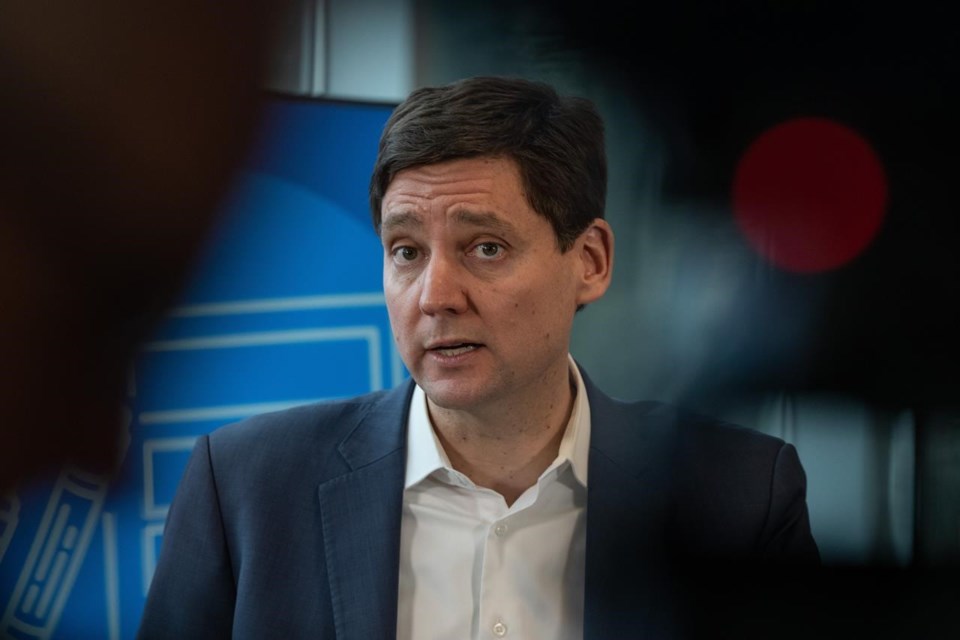VANCOUVER — sa¹úŒÊŽ«Ãœ Premier David Eby has rebuffed the province's retiring chief coroner's swansong pleas for non-prescription safe supply of drugs, calling it a "fundamental issue" of disagreement on how to curb the toxic drug crisis.
"I do not believe that the distribution of incredibly toxic opioid drugs without the supervision of a medical professional in British Columbia is the way forward and the way out of the toxic drug crisis," Eby told a news conference.
Eby said Thursday that he appreciated Lisa Lapointe for her "important and profoundly challenging work," a day after she used her final press conference to announce a record 2,511 people had died of suspected illicit drug poisoning last year.
Lapointe had said that asking doctors to prescribe a safer supply of drugs would not address the crisis that has claimed almost 14,000 lives since the province declared a public health emergency in April 2016, noting that only about 5,000 people had access to prescribed safer supply.
Eby said he believed the only way out of the crisis was to prevent people from using toxic street drugs and help them rebuild their lives, such as opening more detox spaces.
“Our vision is that no person should have to wait for detox. No person should have to wait for treatment,” said Eby.
He said he was disturbed that a record number of people died in the province last year of illicit drug overdoses, saying he recognized that more needed to be done to stop it.
But he said the addition of 180 publicly funded treatment and recovery beds across the province was a step toward saving lives.
The province said nearly 100 of these beds are already open and available to British Columbians in several communities while the rest are expected to be launched by summer.
Eby told the news conference that most of these were previously private beds, and only available to people who paid thousands of dollars, but now they are freely available to the public.
He said the move would allow more people with addictions to access high-quality treatment "close to where they live, without worrying about how to pay for it."
The government says there are currently 3,596 publicly funded adult and youth addiction treatment beds in sa¹úŒÊŽ«Ãœ
Brenda Plant, executive director of Turning Point Recovery Society, said the new beds would help remove barriers for people who can't afford services and reduce wait times for them.
“We are decreasing the burden on our health care system by getting people into treatment sooner," she said.
"We're also providing hope for families who live with the devastating impacts of having family members with addiction issues by getting their loved ones into treatment sooner."
Eby said the record death toll reported by Lapointe was "disturbing," underscoring the importance of the work they need to do to support people amid the public health crisis.
"Our goal is ultimately to get to a system (in which) when somebody's ready for care, that high-quality care is ready for them when they are, and there is not a barrier of cost, of wait … that's what we're working toward.
"We're not there yet, but we're going to continue that important work," said Eby.
Mental Health and Addictions Minister Jennifer Whiteside said there was no "cookie-cutter" approach to the crisis, and the delivery of these beds is one of many pathways to support people in need.
Lapointe's views on the crisis echo a recent coroners service death review panel report that recommended providing controlled drugs to people without prescriptions.
But the proposal was immediately rejected by the government in November, moments before Lapointe had an opportunity to present the conclusions at a press conference.
Eby said Thursday that there was common ground, however.
"The coroner, myself, Minister Whiteside, and all British Columbians have the same goal of ensuring that treatments are available for people when they need it and that the treatment that's available is of the highest possible quality," he said.
This report by The Canadian Press was first published Jan. 25, 2024.
The Canadian Press



